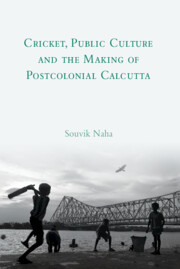Book contents
- Frontmatter
- Dedication
- Contents
- Acknowledgements
- List of Abbreviations
- Introduction
- 1 Cricket, Syndicated Englishness and Postcolonialism
- 2 Narratives of Cricket and Collective History
- 3 The Making of a City of Cricket
- 4 Politicians, Patronage and Centre–State Relations
- 5 Spectators, Gender and Public Space
- 6 The Moral Economy of Violent ‘Gentlemen’
- Conclusion
- Select Bibliography
- Index
4 - Politicians, Patronage and Centre–State Relations
Published online by Cambridge University Press: 23 November 2022
- Frontmatter
- Dedication
- Contents
- Acknowledgements
- List of Abbreviations
- Introduction
- 1 Cricket, Syndicated Englishness and Postcolonialism
- 2 Narratives of Cricket and Collective History
- 3 The Making of a City of Cricket
- 4 Politicians, Patronage and Centre–State Relations
- 5 Spectators, Gender and Public Space
- 6 The Moral Economy of Violent ‘Gentlemen’
- Conclusion
- Select Bibliography
- Index
Summary
In February 1959, after the West Indies had trampled India 3–0 in a five- Test match series in India, some parliamentarians in the lower house discussed how to improve the national team’s performance. Jaipal Singh, former hockey captain, was against touting these defeats as a ‘national catastrophe’, as defeats should be taken sportingly. Yet, he added, to the elation of communist members, that sportspersons were the country’s best ambassadors and corruption in sport administration must not be tolerated. In particular, most parliamentarians opposed the corrupt ad hoc committee appointed by the Ministry of Education to review the cricket board’s operation. Finally, Singh suggested that parliamentary cricket teams should play a healing role in troubled areas since cricket seemed to have a ‘mellowing effect’ on the political atmosphere. The two-hour discussion revealed how important politicians thought cricket was for India’s national prestige, and also the personal attachment of several politicians with cricket. Members of parliament (MPs) are known to have requested declaration of holidays during cricket matches. Congress leader H. P. Saksena asked the chairperson, in vain, for a holiday on the first day of the India–New Zealand Test match in Delhi in 1955. In 1972, several MPs demanded the installation of a television set in the Central Hall of the parliament for the India–England Test match. Politicians have appeared at receptions, distributed prizes, mingled with cricketers and delivered speeches on the contributions of cricket to the nation. Some of them were quick to exploit the sport’s political potential by being involved in sports administration.
Leveraging sport for political purpose was not uniquely Indian. British monarch George V started attending FA Cup finals in 1914, showing his empathy with the event that historian Eric Hobsbawm called the ‘festival of the proletariat’. This ritual presence integrated the political commonplace with the field of public culture, helping to portray the ruler as one of the public and legitimise the state as the public’s representative. Attending sports events henceforth became a part of the royal and political itinerary. The imperial tradition was continued by democratic and dictatorial governments whose appetite for organising and participating in sports events became increasingly insatiable.
- Type
- Chapter
- Information
- Cricket, Public Culture and the Making of Postcolonial Calcutta , pp. 125 - 161Publisher: Cambridge University PressPrint publication year: 2023



